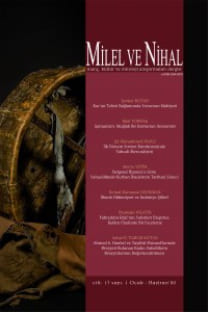Vedalar ve Kaynağı Üzerine On the Vedas and their Origin
On the Vedas and their Origin
___
- Brandon, S. G. F., A Dictionary of Comparative Religions, Macmillan, 1978.
- Carr, Brian and Indira Mahalingam, Companion Encylopedia of Asian Philo- sophy, New York 1997.
- Chatterjee, Satischandra and Dhirendramohan Datta, An Introduction to Indian Philosophy, Calcutta Univ. Press, Calcutta 1984.
- Clayton, A.C., The Rgveda and Vedic Religion, Bharatiya Kala Prakashan, Delhi 2006.
- Dasgupta, Surendranath, A History of Indian Philosophy, (I-V), Motilal Banarsidass, Delhi 1975, ss. I/10-27.
- Dowson, John, A Classical Dictionary of Hindu Mythology and Religion, Rupa & Co., New Delhi 1987, ss. 344-352.
- Ebu Reyhan el-Birunî, Alberuni’s India, (I-II) ed. Edward Sachou, New Delhi 1964.
- Hiriyanna, Mysore, Hint Felsefesi Tarihi, Çev. Fuat Aydın, İntanbul Bilgi Üniv. Yay., İstanbul 2011.
- Jones, Constance A. and James D. Ryan, Encyclopedia of Hinduism, Facts On File, New York 2007.
- Hume, R. E., Thirteen Principal Upanishads, Oxford University Press, New Delhi 1990.
- Keith, A. B., The Religion and Philosophy of the Veda and Upanishads, (I-II), Motilal Banarsidass, Delhi 1989, ss. I/1-15.
- Lochtefeld, James G., The Illustrated Encyclopedia of Hinduism, (I-II) The Rosen Pub., New York 2001.
- Macdonell, A. A., ‚Hymns (Vedic)‛, Encyclopedia of Religion and Ethics, ed. James Hastings, ss. VII/49-52.
- Macdonell, A. A., Vedic Mythology, Trübner, Strassburg 1897.
- Muir, J., Original Sanskrit Texts on the Origin and History of the People of India, Their Religion and Institutions, (I-V) Trübner & Co., London 1868.
- Müller, M., The Vedas, Calcutta 1956.
- Pancheli, Nila, ‚Hinduism‛, Comperative Religions, A Modern Textbook, Blendford Pres, UK, 1982.
- Parrinder, G., Dictionary of Non-Christian Religions, Hulton Educ. Pub., Great Britain 1971.
- Radhakrishnan, S., Indian Philosophy, (I-II), Oxford Univ. Press, Ox- ford2004, ss. I/63-136.
- Sen, M.K., Hinduism, Penguin Book, London 1978.
- Singh, B.N., Dictionary of Indian Philosophical Concepts, Varanasi 1988.
- The Hymns of the Rgveda, Trans. by, Ralph T. G. Griffith, Motilal Banar- sidass, Delhi 1973.
- The Hymns of the Atharva-Veda, Trans. by, M. Bloomfield, Motilal Banar- sidass, Delhi 1987.
- The Laws of Manu, Translated by Wendy Doniger-Brian Smith, Penguin Books, New Delhi 1991.
- The Mahabharata of Krishna-Dwaipayana Vyasa, (I-XII), Trans. by Pratap Chandra Roy, Oriental Pub. Co., Calcutta.
- The Srimad Devi Bhagavata, Trans. by Swami Vijnanananda, 1921-1922.
- Vishnu Purana, Trans. by Manmatha Nath Dutt, H.C. Dass Pub., Calcutta 1896.
- Wilkins, W.J., Hindu Mythology, New Delhi 1986.
- Yitik, Ali İhsan, Hint Dinleri, İzmir İlahiyat Vakfı Yay., İzmir 2005, ss. 18- 32.
- ISSN: 1304-5482
- Yayın Aralığı: Yılda 2 Sayı
- Başlangıç: 2003
- Yayıncı: Milel ve Nihal: Eğitim, Kültür ve Düşünce Platformu Derneği
‘Allah’ın Kelâmına Dair’ Altmışbeşinci Bölüm
Musâ b. Meymûn, Musâ b. Meymûn (Maimonides) El-Kurtûbî, İsmail TAŞPINAR
Halku’l-Kur’an Meselesinin Politik İstismarı Political Exploitation of Khalq al-Qur’an Issue
Vedalar ve Kaynağı Üzerine On the Vedas and their Origin
Ali İhsan YİTİK, Hammet ARSLAN
Kelâm İlminde Vahiy Revelation in Kalam
Kelimeler Arasındaki Farklar & Ebû Hilâl el-Askerî, Arap Dilinde ve Kur’an’da Farklar Sözlüğü,
Hıristiyanlıkta Vahiy Algısı Perceptions of Revelation in Christian Thought
